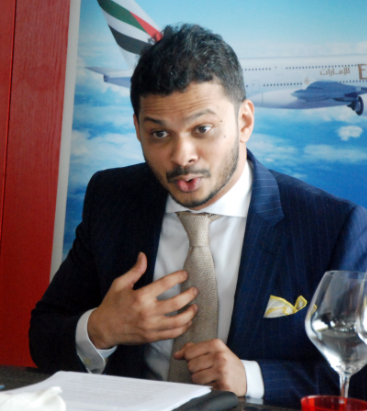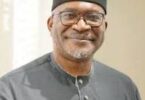Emirates Regional Manager, West Africa Commercial Operations, Afzal Parambil, in this interview with CHUKWUEMEKE IWELUNMO, highlights the importance of Nigeria’s aviation market to Emirates Airlines and its connectivity to world’s biggest aviation market, China. He speaks on other issues about the airline’s expansion policy, among others. Excerpts
You were recently posted to Nigeria as Regional Manager for Emirates, but it looks as if you have been here for ages. You seem to know so much about airline operations, what is responsible for this?
I have been in Emirates for over 15 years. Within those years, I have played several roles, but predominantly I have spent most of my time in Dubai.
I have been looking after different commercial roles in different regions such as Asia, Europe, Far East, Middle East and Africa.
To me, Nigeria is not unknown. I have been coming to Nigeria for the past 10 years as a traveler, as well as a visitor.
It’s quite different from when you come to live in a country like I am living in Nigeria now for the past several months. I must admit that I am a bit late in granting interviews and meeting with the media.
The reasons are not far-fetched. I needed to settle down and attend to urgent issues. Before I assumed duties in Nigeria I was country manager in Ethiopia. Looking at Ethiopia and Nigeria, Nigeria is quite different.
So far, I’m very happy being here. Nigeria is a vibrant place with very entertaining people. I am enjoying being here.
One issue that shook the Nigerian aviation industry was the withdrawal of your Abuja service and reduction of your frequency from 14 weekly to seven. Are you thinking of restoring that service soon?
We stopped our second flight because of operational reasons. We are discussing with the minister of state for aviation on restoring the routes. Very soon, you will hear from us on the matter.
Emirates is a state-owned airline and one of the success stories of state-owned carriers. Do you support Nigeria floating a national airline and what model would you prescribe if you were to advise?
I personally will support national carrier for Nigeria. The model to be adopted depends on the sustainability of the proposed carrier.
There are several models that a national carrier can follow. Emirates is an example of state- owned carrier.
How exciting is Nigeria’s aviation market considering plans by Emirates to restore routes it suspended last year?
Nigeria is crucial to Emirates. Nigeria is actually the second largest market from many perspectives in Africa.
We have lots of plans for Nigeria in terms of growth. China is a very important market, just like the Nigerian market. Similarly, we can’t ignore China or Asia.
In the past, Nigeria used to be a destination for business travellers, but we are seeing a shift in the last couple of years.
More and more people are now travelling to China, not just for business purpose, but also for holidays and leisure as well.
In the past, you’ll see a single man travelling for business, but today, families are travelling to China. This tells you a story that people are now trying to understand China from a different perspective.
We want to take advantage of it; and we want to ensure that we are in the forefront to take the market share.
Emirates operates to about 20 destinations in 13 different countries, which include Hong Kong, China, Japan, South Korea, Singapore, Taiwan, Malaysia, Vietnam, Myanmar and many other destinations.
But China is strategically important. Some of the China destinations include Shanghai, Guangzhou and Beijing, among others.
There are new destinations that are being added and we are continually on the lookout for new destinations.
We have commenced flights from Dubai to the city of Guangzhou, a manufacturing town and business hub, common to most Nigerian importers.
With the new flight schedule, Nigerians wishing to fly to China will find it easier with just one stop over in Dubai before going to their final destinations.
What is driving traffic to China?
The relationship has gone to the next level. Nigerians are looking for partnerships in items for producing goods locally.
Initially, it used to be the case of businessmen travelling to China to buy ready-made goods for sale in Nigeria. Tourism is another thing driving traffic to China.
If I’m a Nigerian going to Beijing, for instance, the next thing I will do after visiting such a beautiful place is to take my family along next time. The more days they stay, the more they enjoy.
For us, this is making sense because when they are coming back from China, they will certainly make a stopover at Dubai for shopping.
What is the percentage of Nigerians going to China? Flight operations don’t just look at one market to a destination to be successful. You must have traffic from China to Nigeria and from Nigeria to China.
As an airline, we pick manufacturers, investors and the likes from any of the China destinations down to Nigeria and back.
As an airline, we play both the roles of making sure we give connectivity to destination like China, to all destinations you want to go.
My colleague in China is also playing the role that I’m playing in Nigeria. Lagos – Nigeria is promoted as an investment destination.
Nigeria may emerge a tourism destination between five to 10 years to come, probably because it has the potential.
South Africa as a destination has faced similar situation that Nigeria is facing, which includes currency devaluation, but it worked in favour of South Africa because it is a tourism destination.
Why is Guangzhou a destination of choice?
Guangzhou is not a choice of Emirates, it’s a choice of the market because most of its manufacturers have exhibition sites at Guangzhou. The gateway was Hong Kong when Emirates started.
Relaunching our flight, we used to operate Boeing 777, now we have introduced our A380 into Guangzhou and we are still considering additional frequencies to Guangzhou to double the capacity. Guangzhou is very important in this new market.
When you fly from home, you’ll see that the next senior crew member is a Nigerian. Our pricing is very competitive. We offer two pieces of baggage.
In the past, we used to give 30kg baggage for economy class passengers, 40kg for business class passengers and 50kg for first class passengers.
When we looked at the requirements of the market, we realised that the market is fast changing.
We relaunched it by two pieces. Economy class passengers can carry two pieces of 23kg each that is 46kg, but business class passengers can carry two pieces of 46kg from Guangzhou.
This is because we realised they don’t just go there and come back empty handed.
Recently, Emirates partnered FlyDubai. Is it a feeder airline like what ASKY is to Ethiopian Airlines? What is the relationship?
We have a sister airline called FlyDubai. We recently stepped up our relationship with Air Dubai. They usually cover secondary cities.
If a given passenger is going to a smaller city like St Petersburg, FlyDubai will be an option. He or she will earn the miles as a Sky member. They also offer 150 destinations.
What is the motivation behind your fleet expansion policy?
Our expansion plans are geographical expansion and within the geography, we are expanding based on demands, but we do have our fleet planning in Emirates.
As we talk now, 44 more Airbus 380, 150 and more Boeing 777 new generation would join our fleet.
Obviously, we have to create demands and we will continue to fly into destinations that give more opportunities and connectivity from anywhere in the world including Nigeria.
Today, we are operating a single fleet out of Lagos, tomorrow you may see two flights out of the city or more. We go by demands and we also create demands.
It was reported recently that Emirates has about the youngest aircraft fleet among several top airlines. Why is this so, considering that aircraft are built to last for 25, 30 years?
Most of the aircraft in our fleet are between the ages of five and six years.
That’s the company’s policy and it is so because of the quality and consistency of our products. It is so for all our aircraft that we put out on all routes.
Whatever quality you find here is what you find on the Guangzhou route. Product consistency can only be achieved if you are consistent with your policy as an airline.
We have plans to phase out older aircraft, which makes it more profitable for the airline.
So phasing out old aircraft and bringing in new aircraft is a process, but the objective is to manage the average age of our aircraft for consistency purposes. Emirates offer over 200 channels on board.
The meals we serve on board are specifically tailored to the requirement of the market. In Emirates group, we have 177 nationalities working in the group. When I was in Dubai, I had colleagues from about 172 countries.
I was handling a department where I had 42 different nationalities reporting to me. It’s a different role when I came to Nigeria.
Our crew members are from 130 different nationalities flying for us. When you fly with Emirates, you will surely see someone from your tribe.








Leave a Comment
You must be logged in to post a comment.